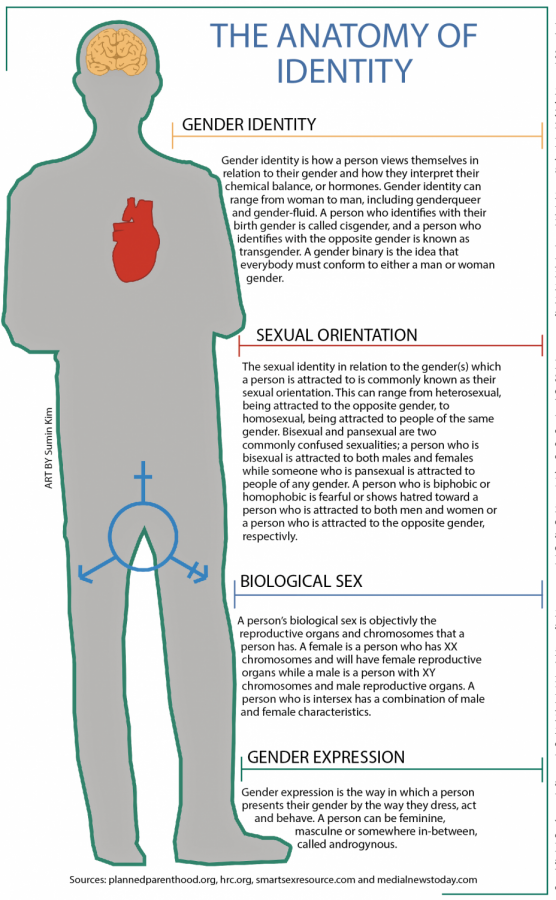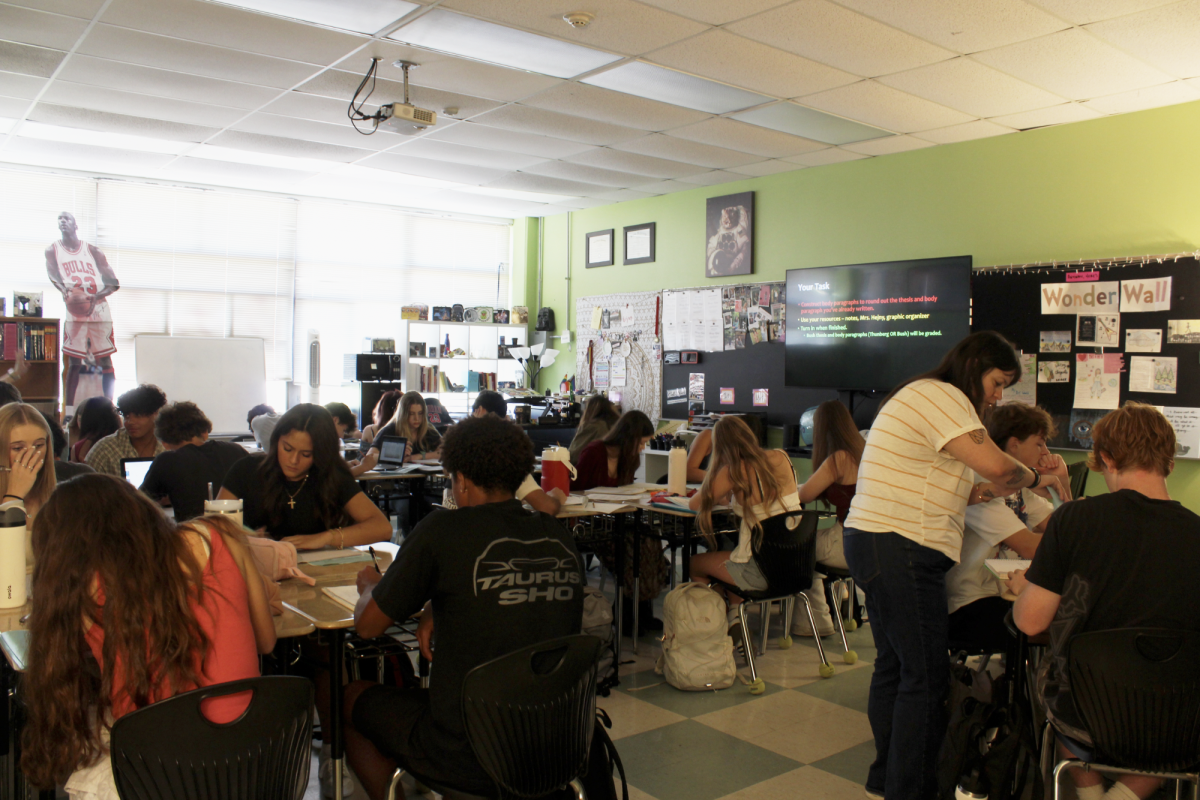Expressing with PRIDE
February 18, 2020
Growing up as an LGBTQ+ individual is difficult, from figuring out your identity to being different from other young adults around you. According to the GSA Network, around 40 states across the country have attempted to create spaces in schools for LGBTQ+ students to express themselves freely, like Gay-Straight Alliances or Sexuality and Gender Acceptance clubs.
SAGA CLUB
The Sexuality and Gender Acceptance club, or SAGA, mainly serves as a safe space for students at Bowie and is sponsored by English teacher Chelsea McCaffery. The club meets on Wednesdays after school in McCaffery’s classroom.
“I know that these students need a space, and if I can be that person, I want to be that person,” McCaffery said. “I’ve seen in my personal life how being a marginalized person, just through my friends and the community that I’m a part of, affect[s] a person and maybe if they had a person or a space like this when they were in school, their experience might have been different. I just want to know as much as I can and be a person that students can come to, and I would hope that any teacher can, but it is nice to have a safe space where students can be with each other.”
SAGA is led by four main officers, junior Guy Ashley and seniors Aaron Bohl, Joseph Holder, and Willow Stacy, who were elected into their positions at the end of the last school year.
“Now that the older members have graduated, I wanted to teach the younger members something sort of like a history, what counts as good representation in media, that sort of thing,” Bohl said. “There is a quote Malcolm X said, ‘If you stick a knife in my back nine inches and pull it out six inches, there’s no progress. If you pull it all the way out that’s not progress. Progress is healing the wound that the blow made.’ I think that’s sort of my whole idea of a club. It’s supposed to be taking steps toward healing, and being the [SAGA] president, I feel like I can help people in different ways.”
The officers in SAGA participated in Pride Week, Oct. 15-18, by reading paragraphs about influential members of the LGBTQ+ community on the morning announcements and handing out AISD Pride stickers.
“With SAGA, it’s less of a school space and we’re less connected to AISD because there’s a lot of students who come in that don’t want to be outed so we try to keep it down low,” Holder said. “LGBT history is a part of my history as an LGBT person, so I’m very interested in it and I liked being able to share it with other people through the announcements.”
The officers of the club decide what they want to discuss at each weekly meeting, whether it’s a focus on trans issues, bisexual visibility, LGBTQ+ history, or another topic.
“Having a safe space is really important, especially in an environment like this where you can’t avoid certain things,” Stacy said. “The campus tries to be inclusive, but [the SAGA] club and that room is really a place where you can avoid someone who’s being homophobic or harassing you. It’s full of people who just generally understand where you’re coming from.”
SEXUAL EDUCATION
On Oct. 28, the AISD board passed a new sexual education program for the district that will begin teaching elementary school students about gender identity, sexual orientation, and sexually transmitted diseases.
“The information is out there on the internet, but there is also a lot of misinformation. If you don’t know where to look, then you can find yourself in a really bad situation,” Stacy said. “I think it could be a good [idea] and could stop a lot of problems within the community like STIs or AIDS; I think it’s really important to make inclusive sexual education more normalized.”
Students like Bohl and Holder believe that the more inclusive sexual education can improve the program in general and allow it to become more interesting and beneficial to other students.
“I think our sexual education is lacking, to say the least,” Bohl said. “A lot of sexual education programs in schools are bad and making [them] more inclusive is probably the first step toward making them better. You would get to learn about more things and be safer. You would get to learn about things like preparation.”
CIVIL RIGHTS ACT
Discrimination against LGBTQ+ workers is legal in most parts of the United States, and the Supreme Court is currently deciding upon whether people within the LGBTQ+ community are to be protected under the Civil Rights Act, according to the New York Times. As stated by CNBC, this case was sent to the Supreme Court due to a man claiming he was fired from his job on the basis of being homosexual. If passed, the Civil Rights Act will give basic protections in the workplace to LGBTQ+ people.
“I think that people are people and discriminating against someone in the workplace is wrong, discriminating against people, in general, is wrong, and I hope that as a society we’re evolving but it’s definitely frustrating to see that we’re backsliding like this,” McCaffery said.
SCHOOL POLICIES
Being respectful of people’s preferred pronouns has continuously been a problem in society and on school campuses.
“For the most part, teachers are really good at it, but there are some that are not,” Stacy said. “As far as teaching, I think that asking students for their preferred pronouns would be great. From trans students, I have heard that the main problem is from the office. They’ll even tell an administrator their preferred pronouns and still get misgendered. Find an administrator or an adult on the campus that understands you and is going to hold other people accountable.”
For some, gender expression is always evolving and the administration has been slowly adapting to become more inclusive.
“As we’re changing as a society and figuring out where this fits in and where gender fits in, whether you’re in the binary or not, we always have to learn and change,” McCaffery said. “I think the administration and teachers are working to maybe stop biased language that happens around campus.”
Trans Experience in high school
Anonymous Guest Columnist
How has Bowie been handling the inclusion of transgender students on campus?
Bowie is better than some schools when it comes to trans inclusion, but it still has a long way to go. Teachers might be taught to respect kids’ pronouns, but often times don’t. If they have an explanation as to why, it’s usually attributed to their age but that’s not a good excuse, especially for a teacher.
A teacher is supposed to teach new things and learn new things for new curriculum. They should be well acclimated to learning how to address someone the correct way. I expect teachers to be able to respect children.
It’s not just a matter of teachers failing to be properly respectful but also a matter of children expecting teachers to help them feel safe.
A kid coming to school knowing a teacher won’t respect them is not going to be a good student, nor are they going to enjoy coming to school. They get to class and get called a name they don’t identify with; they get called by the wrong pronouns and are generally misidentified by the person whose supposed to be the authority. The student usually can’t correct the teacher either in fear of being outed or because they don’t think any change will come of it. It’s a lose-lose situation for the student.
Another argument I hear is that it’s difficult to change. This is false, plain and simple. To make the effort to change how you talk to someone is easy. Respect costs nothing, but the absence of respect has a lot more at stake.
A common statistic is that around 40 percent of transgender teenagers will attempt suicide before their twenties, according to the Human Rights Campaign and the American Academy of Pediatrics. That’s in the United States alone. This statistic is staggering and should be enough of an incentive to respect trans students alone, but that’s not the end. This rate drops to four percent if trans teens are respected and accepted. 36 percent is what’s at stake. 36 percent of transgender kids’ lives are in the hands of teachers, staff, and peers.
My experience as a transgender student has not been as bad as others because people don’t usually suspect me of being trans since I don’t openly present myself as trans. However, other students have been called slurs not just by students but by the staff as well.
Adults hold a position of power and are seen as role models, so when children feel as though a person they look up to doesn’t see them as a person, it can really affect their self-worth. Also, since teachers are role models, students are likely to follow their example and echo the same transphobic ideas that may be held by a teacher.
It’s a serious problem and can really affect a great number of students. It’s up to staff to be the change in statistics, and to make school a safe space for trans kids. There isn’t an excuse as to why adults shouldn’t be protecting kids.








